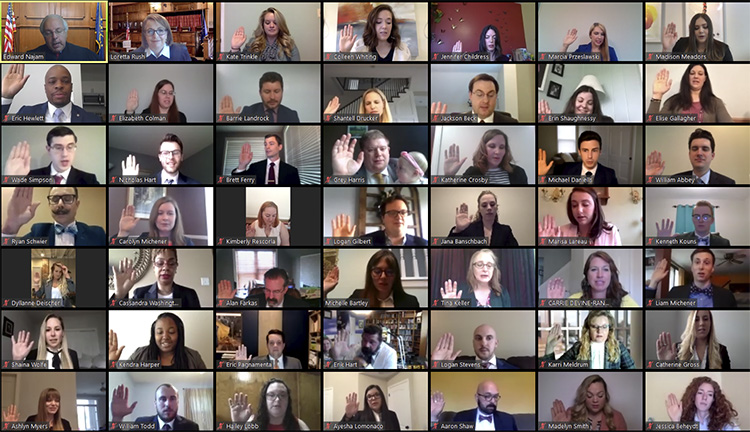By Bradley Skolnik, Executive Director | Office of Admissions & Continuing Education
During its 90-year history, the Indiana bar exam had been offered 187 times as a traditional in-person, closed-book examination. Regardless of the circumstances, the exam was almost always administered like clockwork. Even during World War II, when many men of test-taking age were serving their country overseas, the bar exam was administered at least once annually.
The onset of the COVID-19 pandemic, however, posed significant challenges that placed the July 2020 bar exam in peril. The venue used by the Board of Law Examiners to administer the bar exam to over 500 people was not of sufficient size to allow for social distancing, making the administration of a traditional two-day exam impracticable.

Cancelling the exam was also not a viable option. Depriving recent law school graduates of the opportunity to successfully complete the bar exam and enter their chosen profession would result in great hardship for many. Conversely, admitting all applicants to the profession of law without first requiring them to demonstrate minimum competency fails to safeguard the interests of the public.
In early May, the Supreme Court directed the Board of Law Examiners to administer a special, one-day online bar exam using software that allows for the remote monitoring of applicants. Because the standardized multiple-choice 200-question Multistate Bar Exam could not be administered online, the Court ordered that the exam should consist of the traditional six-question Indiana essay exam and a specially developed twelve-question short answer exam prepared by the Board. Faced with a tight deadline, the Board worked diligently to create a valid, high-quality short answer test.
Along with several other states, the Office of Admissions and Continuing Education retained the services of a bar exam software company that developed a special testing software for the administration of an online bar exam. Unfortunately, following a series of mock exams, repeated software tests, and delaying the exam one week until August 4, it became abundantly clear that the software was not sufficiently reliable to permit the administration of an online exam with remote proctoring.
Confronted with the prospect of cancelling the exam, the Court moved swiftly to devise a creative solution. The exam was converted to an open-book test, thereby eliminating the need for live proctoring and monitoring. The Court directed that test takers receive the exam questions and submit their answers via email according to a schedule established by ACE.
On August 4, thanks to the ingenuity of the Court and the hard work of the Board of Law Examiners, Indiana administered the first-ever “email bar exam.” Remarkably, the exam went off without a hitch. During both the morning and afternoon sessions, more than 500 examinees received the exam questions and submitted their answers in a timely fashion via email.
While it may have been a circuitous journey to arrive at the most unorthodox bar exam in Indiana history, the exam was a smashing success. Not only did the administration of the exam go smoothly, the examinees performed admirably. Of the 512 candidates who sat for the bar exam, a total of 398, or 78%, passed. Among first-time test takers, the passage rate was an impressive 86%. On September 21, we celebrated the admission of many of the applicants who passed the August 4 exam to the Indiana bar in a series of virtual bar admission ceremonies.